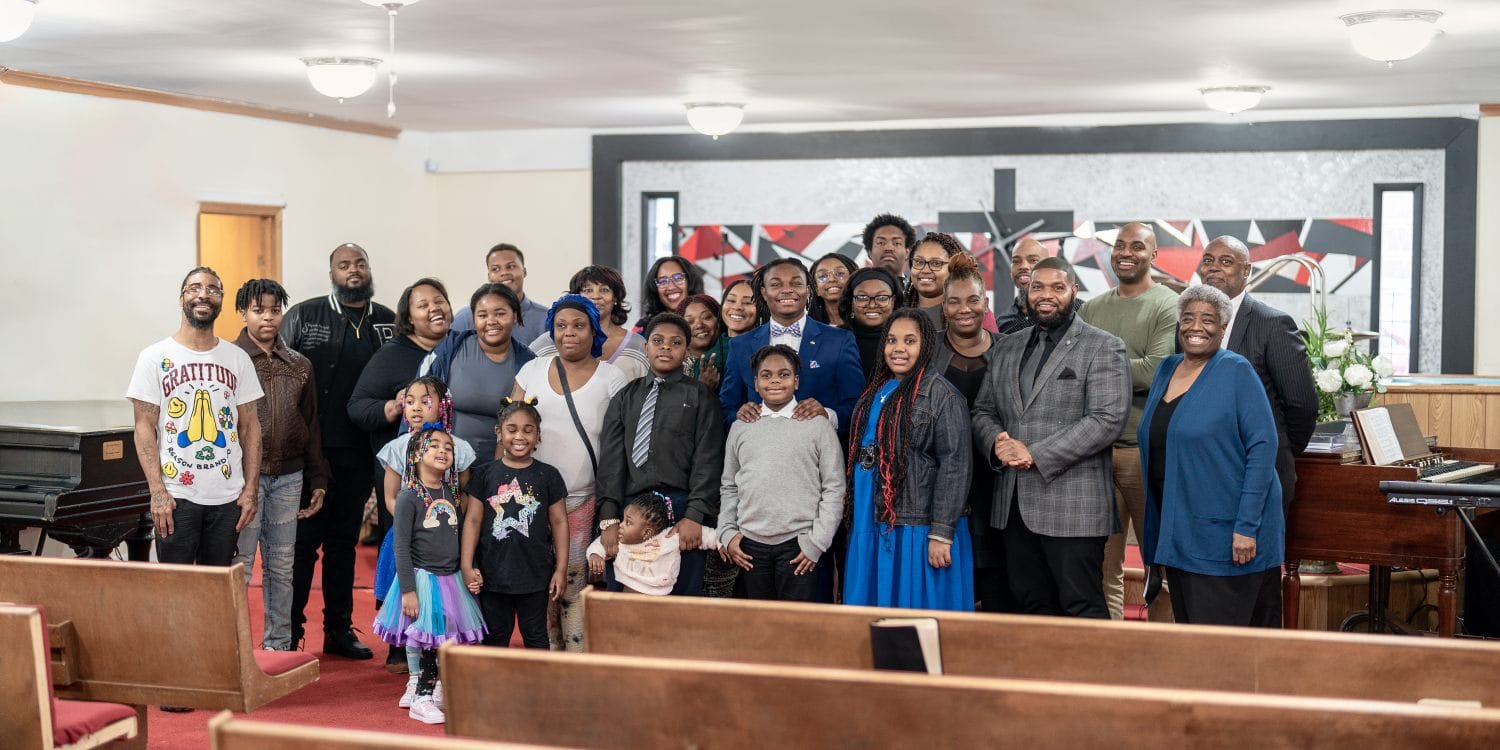
The day of Detroit Center Seventh-day Adventist Church’s long-awaited reopening in January 2024 in Michigan, United States, was one of the coldest days in memory.
Inside the unassuming beige brick, one-story building, a familiar sense of warmth and fellowship filled the air, a welcome contrast to the frigid bite of winter. The praise team led the congregation in songs of gratitude, restoration, and resilience. A chorus of “Leaning on the Everlasting Arms” could be heard down the quiet street.
It had been almost four years since anyone worshiped in the building on Puritan Avenue.
More than 90 smiling faces reflected the light of a spiritual home reborn. Worshippers from Pontiac, Flint, and Saginaw Adventist churches helped to fill the pews alongside the remaining Detroit Center members and a few new converts. The congregation buzzed with a renewed sense of faith, connection, and purpose.
Steve Bramwell, with the support of his wife and former church members, had helped steer the congregation through a transformative period of outreach and rebuilding, after he had been assigned in early 2023 as pastor of both Pontiac Southside and Detroit Center churches. On that Saturday (Sabbath) in January, Bramwell hustled between pews, greeting congregants and ensuring everything was in place.
“Who’s excited to be back here?” Charles Branch, an elder from the Pontiac Southside church, asked the assembled crowd of members and guests. “This building is a metaphor. It doesn’t look how it used to look. We don’t look how we used to look.”
The pandemic had emptied the pews of Detroit Center. The building fell into disrepair. Although the building had reopened, the long road back had not been easy. And with only 10 to 15 members in the post-pandemic era, Detroit Center has its hands full with the effort to repopulate the pews with new members.
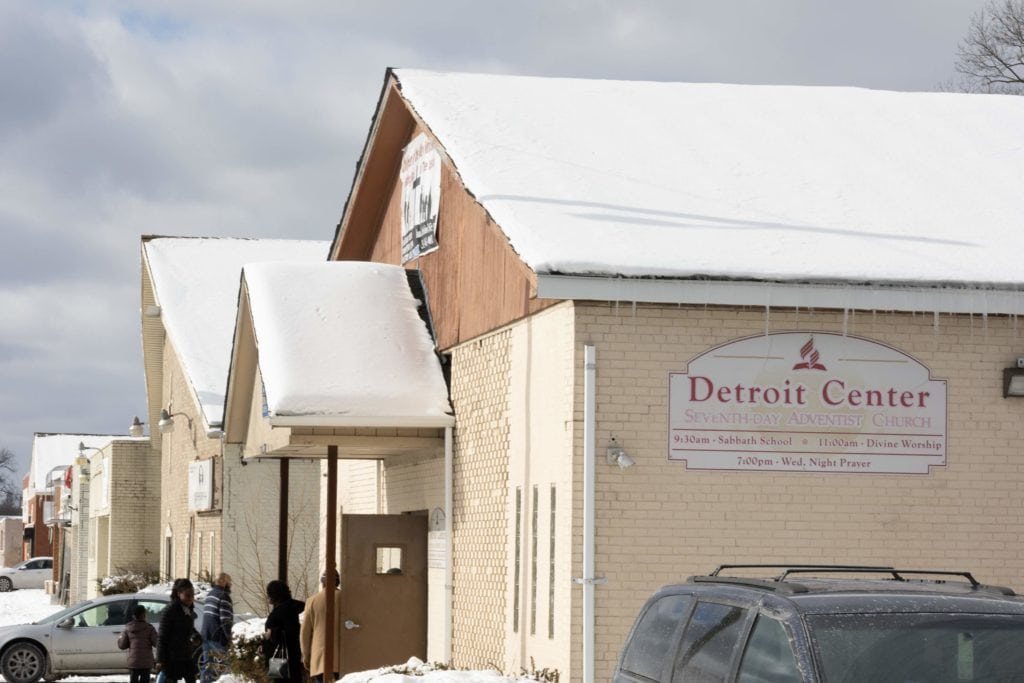
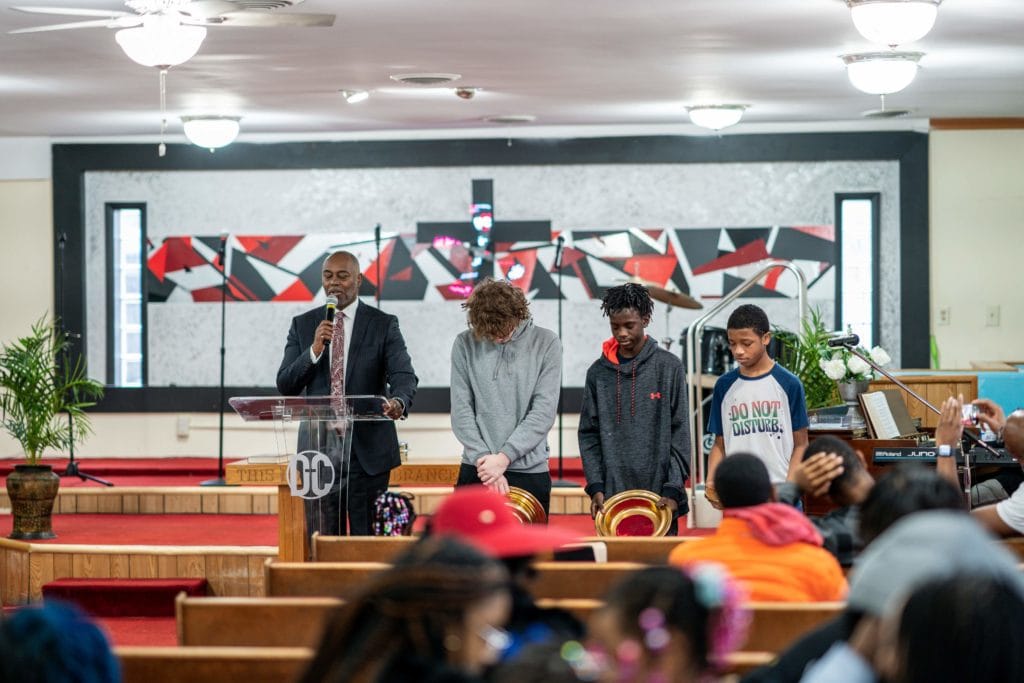
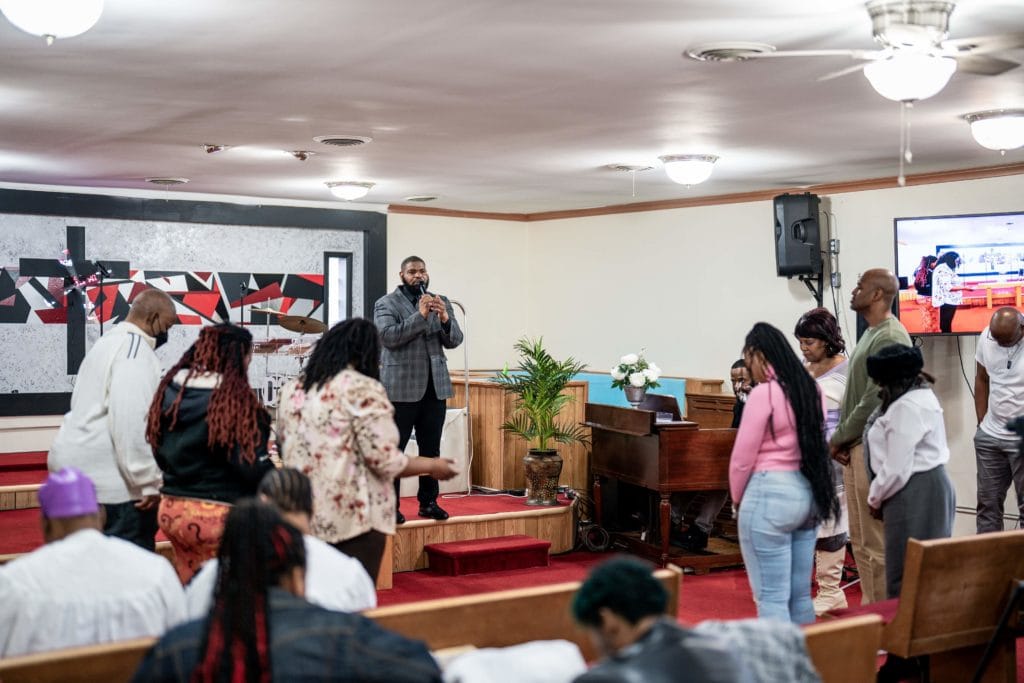
A Small Church Family
Before the shadow of COVID-19 fell, Detroit Center church had thrived as a close-knit family. Every week, 50 to 70 members gathered — bound not just by faith but by deep, interwoven personal histories. It was a small church body in a small church building. Many of the members had known each other for decades. Many of them were related.
This was a place where generations had grown, celebrated, and mourned together — from dedications and weddings to funerals.
“It was like a second home, filled with laughter and love every Sabbath,” Shelia Johnson, who grew up at Detroit Center with her three brothers, pointed out.
For Shelia and many others, the church was more than a building; it was the people. It was a home. She was married there. Her children were dedicated there. When her father passed away, the church was the venue for the funeral.
“This church means everything to me and my family,” she said.
Myrtha Pettiway, a Detroit native and lifelong member, echoed this sentiment. She has been attending Detroit Center for more than 50 years — since she was nine years old.
“Before the pandemic, we weren’t just a church; we were a family,” Myrtha said. “Every face was familiar, every story shared.”
As Myrtha reminisced during the worship service, her daughter, Tawana Pettiway, busied herself in the kitchen preparing Sabbath lunch. The menu included vegetarian prime steak, green beans, rice, macaroni, salad, warm rolls, and more. No one would leave the reopening hungry.
“When my mom passed away in 2022, I felt so supported,” Myrtha said. “Everyone at Detroit Center was sweet and loving. A lot has changed since I was younger — but here, that’s a good thing.”
For lifetime members like Shelia and Myrtha, Detroit Center church was the heart of their community. Its restoration wasn’t only wanted; it was a deep need. Detroit Center represented decades of shared memories, faith, and the spirit of a family that had weathered life’s storms together.
Quarantined, Closed, Condemned
Several weekend winter storms tormented the Detroit Metro area in February 2020. Church service was canceled, and members weren’t happy. As Detroit residents, they were used to venturing out despite several inches of snow on the ground.
The contentious decision to cancel the church service due to a snowstorm foreshadowed the impending isolation the pandemic would bring.
When the COVID-19 pandemic swept across the globe in March 2020, it devastated Detroit Center church in its wake. The virus, indiscriminate and ruthless, tore through the fabric of the congregation, claiming the lives of key lifelong members, and forced doors shut.
“I was scared when COVID hit,” Myrtha said. “We didn’t know what was going to happen to our small church family.”
The loss of cherished members — a head deacon, a beloved aunt, a cornerstone senior citizen — left a palpable void.
“The pandemic was devastating for our church,” Toson Knight, elder and lifelong member, said. “We lost key members, including my aunt, who led women’s ministry and AY for years. This was a major loss for a small, family-oriented church like ours.”
Communities all around them also reeled and suffered. The four counties encompassing the Detroit urban area, including Wayne, Macomb, Oakland, and Detroit city, have reported a staggering 19,000 COVID-related fatalities, according to Michigan Disease and Surveillance System and Vital Records.
The church, too, found itself in a state of desolation.
“The building was completely condemned when my family and I were reassigned to this district [in early 2023],” Bramwell said. “It needed a lot of work to be operational.”
The church’s structure, already aged, had deteriorated further with time. Hidden asbestos and a collapsed air conditioning unit, which led to a caved-in roof, marked the decline. This damage ushered in the unforgiving elements. Soon, moisture crept in and created an environment where mold began to spread.
“It was heartbreaking, watching your home fall apart,” Shelia said. “I felt helpless. I wasn’t sure what to do or what we could do. It was heartbreaking seeing the church I loved in this condition.”
The church’s attempts to pivot to virtual sermons captured only a fragment of the congregation as the devastating impact of the pandemic became apparent.
“Virtual church services had its benefits,” Sheila explained. “We were still able to receive the Word. But it was different. With virtual church comes a certain level of comfort with staying at home.”
A decline in church membership and attendance was not unique to Detroit Center. The closure echoed a broader trend nationwide. Pew Research Center’s data showed a slight nationwide decline in monthly religious attendance, with in-person participation dropping from 33 percent to 30 percent post-pandemic.
A large number of Black churches struggle to attain pre-pandemic membership and giving levels. Drops in attendance, finances, and clergy well-being were especially pronounced for Black churches, according to a January 2024 study by the Hartford Institute for Religion Research.
While 65 percent of white congregations say their finances have stayed the same or improved since 2018, only 50 percent of Black churches could say the same.
Detroit Center, a once-warm church family — resilient in the face of even the heaviest snowfalls — found itself grappling with unprecedented silence.
Now charged with the task of reopening the doors of Detroit Center, Bramwell faced the challenge of reaching a community hungry for connection and guidance. But it wouldn’t be easy. The needs of the community were great, and his manpower was limited.
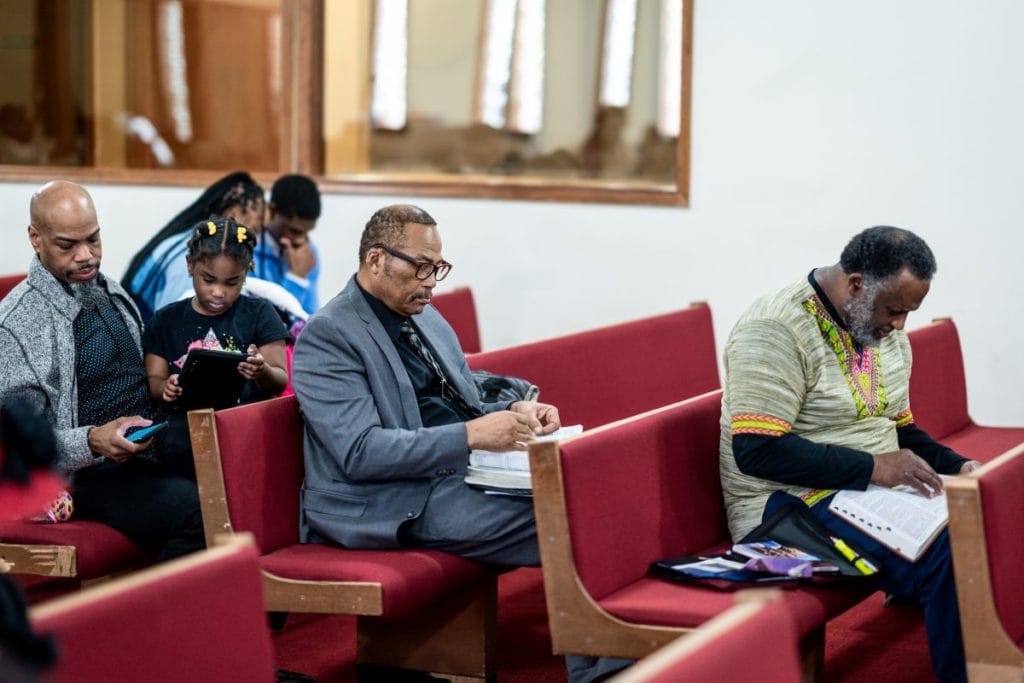
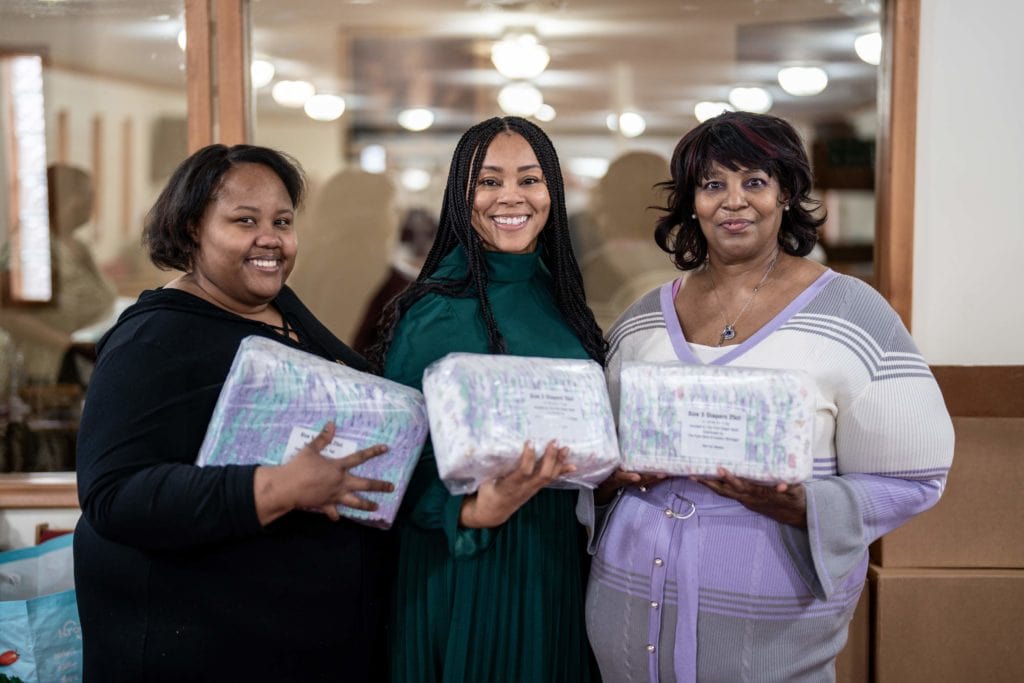
A Community in Need
Bramwell is no stranger to communities in dire need. When he stepped into the role at Detroit Center, he brought with him not just hope but a blueprint for revival honed through years of ministry under trying circumstances.
With God’s guidance, he had been pastor of a church in Flint, Michigan, at the height of the water crisis in 2014. He then led that congregation through the pandemic before being reassigned to serve both the Detroit Center and Pontiac Seventh-day Adventist churches last year.
His time in Flint during the water crisis and pandemic taught him to remain flexible and to pool resources for cost savings and the greater good. Detroit now presented its own challenges that demanded faith.
Detroit is the most populous city in Michigan, but many of its residents live in poverty. Detroit has a poverty rate of roughly 30 percent, nearly three times higher than the U.S. national average. Here, the child poverty rate is even higher, at more than 43 percent.
So Bramwell took a data-driven approach to meeting the needs plaguing those near the church. He found a database with demographic information from the Detroit census. The data showed a need for access to children’s clothing, haircuts, healthy food, and medical check-ups and information. An approach Bramwell had refined over the years, called “Seven Touches in Seven Sabbaths,” became his strategic cornerstone for Detroit Center.
The demographic data allowed him to tailor his outreach events to the needs of the community. But, since Detroit Center church was closed, Bramwell needed space to host his program. In mid-2023 he sought and received permission from Cornerstone Lincoln High School to use its parking lot for a series of community-focused events.
For four Saturday afternoons in July and August, the congregation transformed the high school parking lot into a hub of outreach and community support. Bramwell seized the good weather as an opportunity to grow his flock by connecting with the community in a tangible way.
Bramwell, alongside his family and congregants from Detroit Center and neighboring churches in Pontiac, Saginaw, and Flint, hosted weekly health fairs, back-to-school rallies, sneaker giveaways, and food distributions. Across all three locations plus Detroit Center, the team distributed more than 300 backpacks and pairs of sneakers to families in need.
It wasn’t easy — the giveaways were attended by hundreds of community members. Bramwell and the team were stretched thin. Although they planned to do seven touchpoints, manpower limitations allowed them to do only four.
Despite the challenges, particularly the scarcity of volunteers to lead Bible studies, the community programs were a beacon of hope, signaling the rebirth of a church community determined to rise from challenges and tribulation.
Bramwell’s research also revealed that around 500 to 700 children were born in the area after March 2020.
“It’s simple: hundreds of newborns means that our community needs diapers,” Bramwell explained. The congregation bought and distributed hundreds of diapers during the Seven Touches in Seven Sabbaths program between July and August of 2023.
Detroit Center has continued the diaper distribution every second and fourth Sabbath.
“The goal is to make sure the community views us as a reliable resource,” Bramwell said. “We meet their needs, following the blueprint that Christ laid out.”
Bramwell’s strategy to rebuild focused on acts of service to touch hearts and showcase Christ’s love. It was a reflection of the profound kindness once shown to his own family decades earlier by Bible workers Peter Leonce and Sarah Peterson. They had stepped in to support him and his young family in a time of great need.
“When my father-in-law passed away in Jamaica, we couldn’t afford the plane fare to fly from New York to attend his funeral. My wife, Shyenn, was devastated,” Bramwell recalled.
“But for the first time in my life, I saw Christ when those Bible workers volunteered to pay for our plane tickets. We didn’t ask. They saw our need, and they met it,” Bramwell said. “I learned that day that you can speak about Christ’s love, but people need to see it. In ministry, it’s that simple. We’re here to actually show people Christ.”
For Bramwell, this act of generosity not only opened his heart to the teachings of Christ but also instilled a profound understanding of ministry as primarily an act of service to those in need.
The success of the touchpoints was measured not just by the goods distributed or services rendered but by the names gathered for follow-up and Bible study, marking the beginning of new spiritual journeys for many.
The Love of Christ in Action
Now, months later, it was a frosty January morning in Detroit. The grand reopening was just days away — set for January 20. There was still much to do before the 11:00 a.m. worship service.
The once-condemned church building now echoed with sounds of renewal, revival, and restoration. Hammers knocked, drills buzzed, and vacuum cleaners hummed. Bramwell and his wife were leading a team of eager volunteers through cleaning and preparing the church for the first Sabbath service in almost four years.
Volunteers like Glenda Mosley, Bobby Porter, Danny Watley, and Carol Conner were there to help. Carol and Bobby, active Flint church members, dusted and vacuumed the sanctuary. In the next room, Mike Fogle, once imprisoned due to choices in his past, worked tirelessly to finalize construction in the room that would soon host Sabbath lunch.
Just six months prior, Mike was sitting at the local police station for a program. An officer noticed his infant daughter and told him about a church giving away diapers to families in need.
Mike wanted the diapers, so he told his wife about it. He had no way of knowing he would become integral to that church building’s restoration.
“I’ve never experienced church outreach like that before,” Mike said. “I told my wife Ayisha about the free diaper program so she could get some for our youngest daughter, Honesty.”
Although the supply had run out by the time Ayisha arrived, Bramwell followed up and made a house call to deliver not only diapers but new sneakers for their 11-year-old son, Robert.
“He brought us diapers, clothes for the baby, and shoes for my son,” Mike said. “We developed a relationship with the pastor.”
Before long, the couple began Bible study with Bramwell.
“He would have us do different readings, and he made sure we understood everything,” Mike said. “We received so much help and counsel from him. I learned more about God and the love of Christ. Eventually, we started to ask him where the church was.”
But Detroit Center was still not operational — the building needed repair. Bramwell let them know it would open eventually; the building was currently under construction.
“I’m licensed to support home improvement projects,” Mike said. “I’ve done a lot of remodeling work, so I told the pastor that this is what I know how to do if you need help.”
For Mike, this was an opportunity to get further connected to the church community that had helped his family. He didn’t take it lightly.
That’s how, within six months of meeting Bramwell, Mike was among the team of busy volunteers preparing the church for reopening.
“This means a lot to me,” Mike explained. “They believed in me and came out of their comfort zone to trust me to come into their home. They’ve invested their time and money into this building, and it feels good to be trusted.”
Through consistent community connection, Bramwell and his small but mighty team of congregants showed the love of Christ in action.
His team helped meet the needs of people like Mike who found both a new spiritual home and a place to meaningfully contribute to rebuilding and find redemption.
Bramwell’s vision for the church’s future was clear and ambitious. He saw beyond the immediate restoration, envisioning a new facility that would not only serve as a place of worship but as a vibrant community service center.
He had successfully secured a US$200,000 grant from the state to support afterschool programs in Pontiac and Flint. Motivated by this, he now seeks to replicate this success at Detroit Center.
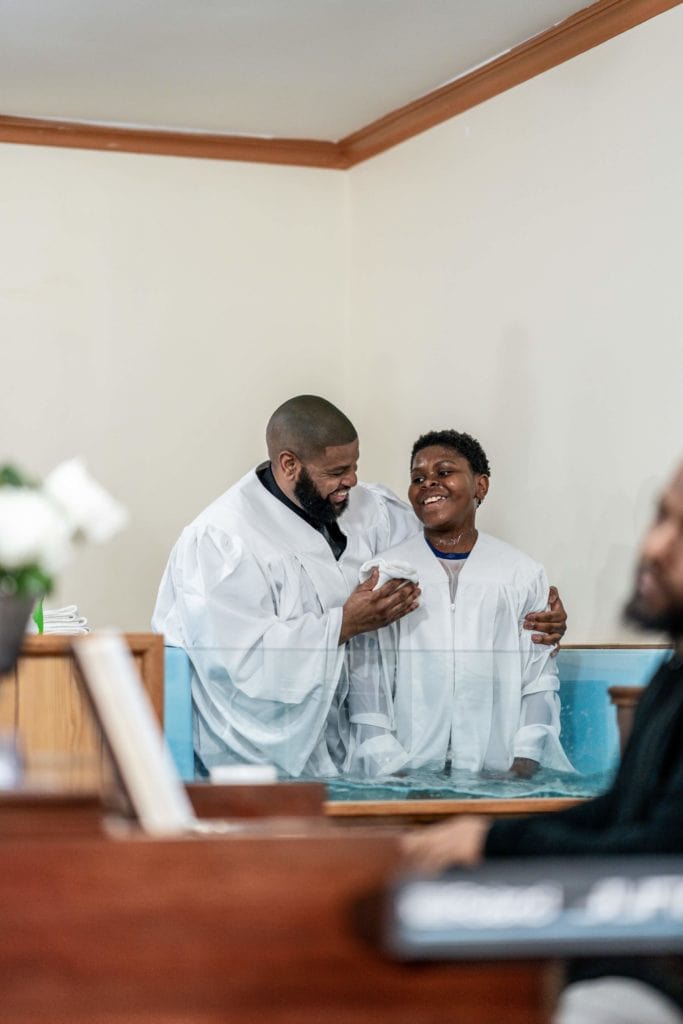
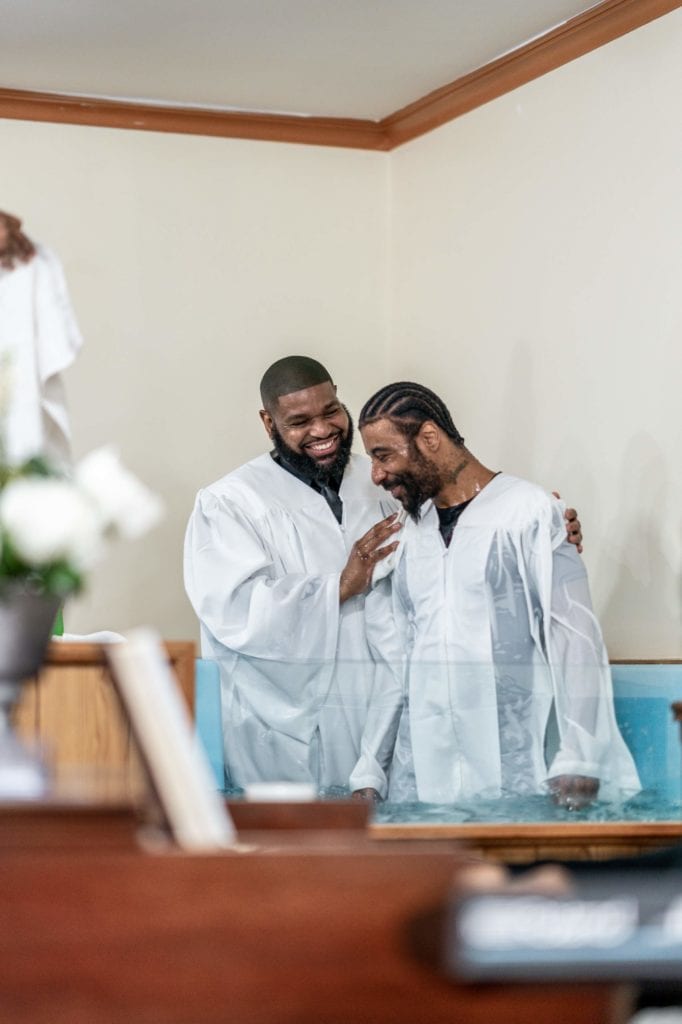
Rebuilt and Restored
In keeping with the theme for the year, Rebuild and Restore, Shelia Johnson, a lifelong Detroit Center member, stood on the day of the grand reopening to share a heartfelt presentation. Her voice, laced with emotion, spoke of the church’s journey through painful years.
“Church is more than receiving the Word,” Shelia said. “It’s about fellowship, connection, and being the arms and legs of Christ in the community.”
And as Bramwell delivered his sermon, titled “God Restores,” he drew parallels between the biblical promises of renewal and the church’s own story of revival. The congregation listened intently, with Mike among them. Mike’s presence was a powerful symbol of the church’s mission actualized.
The Sabbath service culminated with an altar call, a poignant moment as Mike stepped forward.
In many ways, Mike’s journey mirrors the church’s path to restoration. His family is a reminder of the grace of God and His ability to use the church body to touch lives.
Mike’s hands, once marked by the challenges of his past, had actively contributed to the church’s future and physical renewal. And now he was preparing to embrace a new beginning.
The Sabbath after the grand reopening, Mike and his entire family were baptized. And a week later, Bramwell baptized 10 more new believers into the church.
“No one is perfect,” Mike said. “But God told me it was time to reconnect with Him. It’s about coming back to Christ. That’s what I believe, and that’s what Detroit Center represents to me. I’m happy to be part of this small church family.”
As the service drew to a close, a benediction by the pastor’s wife, Shyenn, reminded everyone that the day’s celebration was not an end but a beginning.
The church, once on the brink of being forgotten, now stands as a symbol of hope and help to the community they serve.
“Meeting people’s needs opens their hearts to Christ,” Bramwell said. “Once the heart is open, it provides a pathway for us to introduce Christ’s love and teachings. That’s what Detroit Center is focused on.”
The original version of this story was posted by the Lake Union Herald.